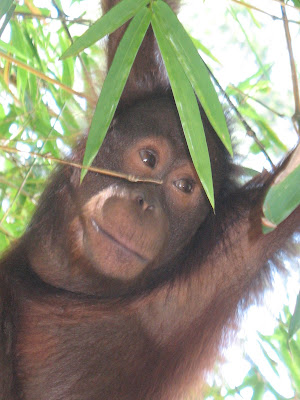Being Primal means that we acknowledge our shared ancestry
with life on this planet – many thanks to Charles Darwin’s Theory of Evolution.
But being Primal means then that we acknowledge our shared characteristics with
other life on this planet:
“Primates matter. I don’t need to
give you justifications describing their economic value or role in ecosystem
services (although let’s not underestimate their importance as seed dispersers
in tropical forests). Primates share so many of our characteristics – we see ourselves
reflected in their gestures their facial expressions, their social interactions
and the way they nurture their young. Primates hold a mirror up to the human
race and that alone should be enough to justify our working to avoid their
extinction.”
Dr Abigail Entwhistle in “Relative
Importance”, Fauna&Flora, 15, June
2012, p.4.
Primates are our closest relatives – and we are killing them
off. We are killing not just the occasional bad or unlucky individual but we
are killing them all. Imagine an individual from one particular species - Homo sapiens – killing all his or her relatives.
That would be front-page news indeed and cries of shame would echo around the world. But as we kill off our closest
relatives in nature, there is little outrage, few headlines, very few voices calling
for justice to be done, no powerful police teams tackling this odious crime….
Why not?
“Primates are facing a crisis.
This has been the case for the last 50 years at least, and the threats have not
abated.”
Ibid,. p. 5.
It is of course mankind
who is killing its own closest relatives, the primates.
Mankind’s sense of justice and injustice is at times so
self-absorbed, so self-reflecting and so human-self-privileging that it is
classifiable as a kind of mental illness. Teenagers can sometimes be self-absorbed
like this. In their struggle to find themselves in an adult world, teenagers
can be too aware of their own pressing insights, limitations and predicaments
and the demands of their own immediate situations that they often cannot see or
relate to the plights of others – notably their parents. Of course not all
teenagers are like this and there are many examples of “mature” teenagers who
respect and work with their relations to the world outside of their own small selves.
Parents, schools and colleges are very skilled in helping
young people discover their relations with the wider world that has created and
nurtured them and which holds the key to their sustainable future. In a very
real, everyday-living-sense, these wider relations include those that embed us and
enable us to flourish – or wither - in the wider natural world.
If we linger a while with the idea of teenagers finding
their way out of personal limitations and self-absorption, we can build a
better understanding of one cause of mankind’s impact upon nature. Imagine if
on a higher, more complex level, mankind
is like a teenager – locked in an understanding that is far too self-absorbed
and self-reflecting. Indeed if we look at one of – if not THE – controlling influences on mankind’s development,
neo-classical economics and free-market ideology, then this teenage self-referencing
and self-absorption is all too apparent.
The whole sophisticated, magnificent, influential and
exceedingly powerful edifice that has created global corporations, financial
institutions and free-markets that handle billions of dollars daily – is built
upon rational choice theory – it is a system conceived by man, for man, in
the service of man!!
The grown-up, mature, responsible world occupied by too many
business leaders, financiers and politicians world-wide is at heart something
akin to the same kind of self-absorbed, self-reflecting and self-privileging
that it is at best a teenager trait; at worst a kind of mental illness. How
else do you explain the fact that multi-millionaires who have far more money
than they could possibly spend in several lifetimes dedicate themselves to
making even more money – and not enjoying life with all their relations, human and non-human?
 |
| Baby orang-outang at Sepilok Orang-outang Rehabilitation Centre, Borneo, Malaysia |
In 1967, Desmond Morris’s book The Naked Ape: A Zoologist's Study of the Human Animal (Hardback: ISBN
0-07-043174-4; Reprint: ISBN
0-385-33430-3) caused a sensation. It was sensational stuff to compare
mankind with apes and to argue that we are so intimately related.
Unfortunately this sensational news still has still not had
the impact it should in some very major business, economic, financial and
political circles. Too many leaders, first movers, developers and their
followers still behave like teenagers – locked within the boundaries of their far-too-small-worlds
of their own making (more accurately locked within logical belief systems – see
the ISD book).
This is why we are
killing nature on an industrial scale – this is why we are not unfortunately
like those animals who have learned over aeons to live alongside each other.
No comments:
Post a Comment